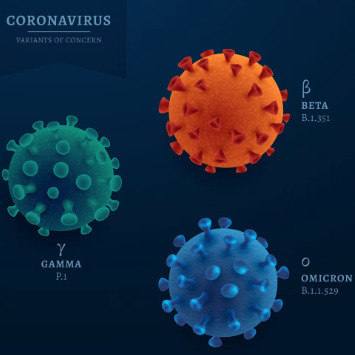SARS-CoV-2 variants of concern: a review

Accepted: October 17, 2022
All claims expressed in this article are solely those of the authors and do not necessarily represent those of their affiliated organizations, or those of the publisher, the editors and the reviewers. Any product that may be evaluated in this article or claim that may be made by its manufacturer is not guaranteed or endorsed by the publisher.
Authors
The virus that causes severe acute respiratory syndrome coronavirus-2 (SARS-CoV-2) belongs to the genus Beta coronavirus and the family Coronaviridae. The SARS-CoV-2 virus is a positive sense, non-segmented single-strand RNA virus that causes coronavirus disease 2019 (COVID-19), which was first reported in December 2019 in Wuhan, China. COVID-19 is now a worldwide pandemic. Globally, several newer variants have been identified; however, only a few of them are of concern (VOCs). VOCs differ in terms of infectivity, transmissibility, disease severity, drug efficacy, and neutralization efficacy by monoclonal antibodies, convalescent sera, or vaccines. VOCs reported from various parts of the world include B.1.1.7 (Alpha), B.1.351 (Beta), B.1.617/B.1.617.2 (Delta), P.1 (Gamma), and B.1.1.529 (Omicron). These VOCs are the result of mutations, with some based on spike proteins. Mutations may also cause molecular diagnostic tests to fail to detect the few VOCs, leading to a delayed diagnosis, increased community spread, and delayed treatment. We searched PubMed, EMBASE, Covariant, Stanford variants database, and CINAHL from December 2019 to February 2022 using the following search terms: Variant of Concern, SARS-CoV-2, Omicron, etc. All types of research were chosen. All research methods were considered. This review discusses the various VOCs, as well as their mutations, infectivity, transmissibility, and neutralization efficacy.
How to Cite

This work is licensed under a Creative Commons Attribution-NonCommercial 4.0 International License.
PAGEPress has chosen to apply the Creative Commons Attribution NonCommercial 4.0 International License (CC BY-NC 4.0) to all manuscripts to be published.
Similar Articles
- Nicholas Zareifopoulos, Maria Lagadinou, Anastasia Karela, Gerasimos Karantzogiannis, Dimitrios Velissaris, Intubation and mechanical ventilation of patients with COVID-19: what should we tell them? , Monaldi Archives for Chest Disease: Vol. 90 No. 1 (2020)
You may also start an advanced similarity search for this article.

 https://doi.org/10.4081/monaldi.2022.2337
https://doi.org/10.4081/monaldi.2022.2337




